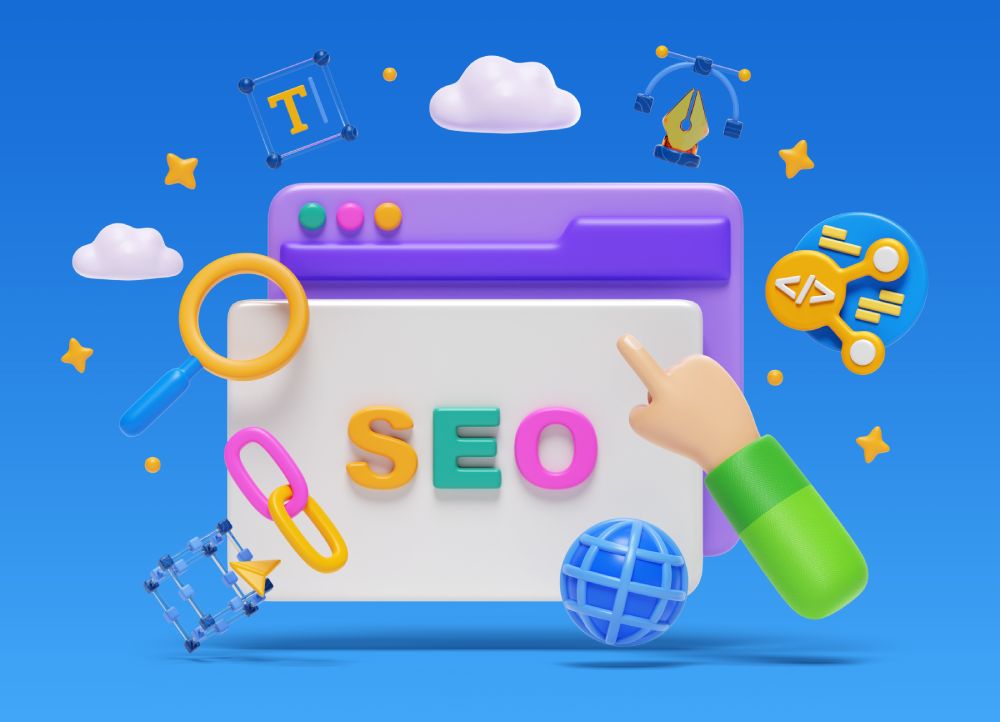In an age where search engine optimization (SEO) reigns supreme in the digital kingdom, the integration of artificial intelligence (AI) stands as a neon signpost marking a new era in how we approach the battle for the top spot on Google.
Businesses have transitioned from the old guards of keyword stuffing and link farming to the polished knights of semantic search and user intent. Now, with AI in the SEO armory, a cadre of techniques and tools is poised not to just react to the algorithms but predict, adapt, and possibly shape them.
The future of SEO with AI is not simply an exciting prospect; it’s a mandate for future growth in the digital marketplace. Understanding how to wield these AI tools is not only an advantage but a necessity to maintaining a competitive edge. Here, we’ll explore the ins and outs of AI’s integration into SEO, the tools transforming the digital landscape, and what the horizon looks like for those who dare to lead with artificial intelligence in hand.
Understanding AI in SEO
At its core, AI’s role in SEO is to enhance and streamline the optimization process, making it more intelligent and efficient. Machine learning algorithms can analyze vast amounts of data at unprecedented speeds, identifying patterns and trends that human analysts might overlook.
This capability allows for predictive analysis, enabling businesses to anticipate changes in search engine algorithms and user behavior, and adjust their strategies accordingly.
AI-powered tools are now capable of conducting in-depth keyword research, optimizing content for both search engines and user intent, and providing insights into the competitive landscape.
They also play a crucial role in personalizing user experiences, tailoring content to meet the unique needs and preferences of individual users. This not only boosts engagement and conversion rates but also signals to search engines that a website is providing valuable content, further improving SEO rankings.
The integration of AI into SEO strategies is a game-changer, offering a dynamic approach to achieving and maintaining high search engine rankings. Those who harness the power of AI effectively will undoubtedly stay ahead of the curve, driving traffic, enhancing user engagement, and ultimately, achieving their business goals.
The Definition of AI in the SEO Ecosystem
AI in SEO is the culmination of advanced techniques in data analysis to predict and influence search engine algorithms. It involves using sophisticated machine learning algorithms to identify patterns in search data, thereby optimizing for those criteria most likely to push a site’s content to the top of search results.
Benefits of AI in Optimizing Search Strategies
The benefits of AI in SEO are manifold. Companies that utilize these tools experience higher search rankings, more organic traffic, and increased insight into consumer behavior. AI streamlines the SEO process, providing both an efficiency boost and a way to measure results more accurately than before, leading to a more impactful and targeted SEO strategy.
AI Tools Transforming SEO
In today’s competitive digital battlefield, understanding and leveraging the right AI tools can differentiate success from stagnation. Among the plethora of AI-powered tools reshaping SEO, a few stand out for their innovative approaches and proven results.
RankBrain by Google is one such tool, a machine learning algorithm that understands and interprets the nuances of user queries to deliver more relevant search results. It goes beyond mere keyword matching, analyzing the context and intent behind searches, and learning from user interaction patterns to improve its accuracy over time.
Another remarkable tool is MarketMuse, which uses AI to analyze content against competitors in the same niche. It identifies gaps and opportunities for content enhancement, ensuring that your content is not just high-quality but also fully optimized for search engine visibility.
SEMRush leverages AI in its SEO toolkit to offer advanced keyword research, competitor analysis, and Google ranking factors insights. It’s an all-in-one platform that empowers marketers to develop more effective SEO strategies backed by data-driven insights.
These tools, among others, are at the forefront of the AI revolution in SEO. They provide a competitive edge by automating complex tasks, delivering deeper insights into search trends, and offering actionable recommendations for optimization.
Businesses that seize the opportunity to integrate these AI tools into their SEO strategies will not only achieve higher rankings but also establish a dominant online presence that is both resilient and forward-thinking.
Natural Language Processing (NLP)
NLP is AI’s gateway into understanding human language in a manner that allows it to interpret context, not just keywords. This means that search engines armed with this technology can now decipher subtle nuances in how users phrase their queries, matching them to more relevant results. For businesses, this translates to more accurate, effective content that truly resonates with their audience.
Machine Learning for Predictive Analysis
By using historical and real-time data, machine learning can predict trends and shifts in user behavior and search engine rankings. This kind of predictive analysis enables SEO professionals to be proactive in adjusting their strategies to maintain visibility in an environment where change is constant and often rapid.
Image and Voice Search Optimization
With AI, image and voice recognition have leapt forward. Voice search is increasingly prevalent, and AI can optimize content to match the conversational nature of these inquiries.
For images, AI can not only help search engines ‘see’ the content but also assist with image tagging and contextual placement, ensuring that it aligns with Google’s AI-prioritized visual search requirements.
Impact on Search Algorithms
The integration of AI into search algorithms represents a monumental shift in how search engines determine relevance and rank pages. Traditional signals such as keywords and backlinks remain important, but AI introduces a more nuanced assessment, focusing on user satisfaction and content quality.
Google’s RankBrain is an example of AI’s growing influence, prioritizing pages that best answer the user’s intent, even if they don’t contain the exact query terms. This necessitates a more holistic SEO strategy, where the value and relevance of content are paramount.
AI’s ability to adapt and learn from data means search algorithms are becoming more sophisticated, capable of identifying and penalizing attempts to manipulate rankings through black-hat SEO techniques. Consequently, SEO professionals must adopt a more authentic approach, creating content that genuinely serves users’ needs and interests.
Furthermore, AI-driven algorithms are increasingly capable of understanding and indexing different types of content, including video, images, and voice, broadening the scope of SEO beyond traditional text-based content. This evolution underscores the importance of a diversified content strategy that encompasses various formats and channels.
In summary, the impact of AI on search algorithms elevates the importance of quality, relevance, and user experience in SEO strategy. Businesses that adapt to these changes and leverage AI’s capabilities will not only survive but thrive in the dynamic landscape of search engine rankings.

Google’s AI-Driven Updates
Google has been the pioneer in integrating AI into its algorithm updates. Each core update now comes with a more comprehensive understanding of language and context, effectively reshuffling the SEO deck. Those who can adapt their strategies to align with these updates are the ones who continue to see success in the rankings.
Personalized Search Results
One of AI’s most profound impacts is in personalization. Search results are no longer universal. AI tailors each search to the individual, taking into account location, search history, and other parameters. This personal touch requires a more nuanced approach to SEO, ensuring that content meets not just the broad demands of search engines but the nuanced needs of consumers.
Voice Search Implications
Voice search adds another layer to the SEO puzzle. With its focus on conversational keywords and context, optimizing for voice search demands a shift in the traditional SEO mindset. AI tools are now capable of dissecting these more conversational queries and tailoring strategies to provide the type of content these searches target.
Challenges and Opportunities
The advent of AI in SEO presents both significant challenges and opportunities for digital marketers. On the challenge front, staying ahead of the technological curve requires constant learning and adaptation.
The rapid pace at which AI and machine learning technologies evolve means strategies that were effective yesterday may not hold the same potency today. Additionally, the increased complexity of search algorithms, driven by AI’s nuanced understanding of content, demands a deeper, more sophisticated approach to SEO.
Marketers must now consider not only the keywords but also the context, intention, and user experience of their content to ensure it aligns with what AI-driven algorithms deem valuable.
However, these challenges are paralleled by unprecedented opportunities. AI’s capability to analyze vast amounts of data at incredible speeds enables marketers to gain insights into consumer behavior, preferences, and trends like never before.
This data-driven approach allows for the creation of highly targeted, personalized content strategies that speak directly to the audience’s needs and desires, increasing engagement and conversion rates.
Furthermore, AI technologies offer tools to automate many of the tedious, time-consuming tasks associated with SEO, from keyword research to content optimization, allowing marketers to focus more on strategy and creativity.
In harnessing the power of AI, businesses have the opportunity to elevate their SEO strategies, making them more efficient, effective, and aligned with the user’s intent.
The key to success in this AI-driven landscape is a willingness to adapt, learn, and innovate, leveraging the technologies available to create truly compelling and valuable content that stands out in the crowded digital space.
Data Privacy Concerns
With the power of AI comes a spotlight on data privacy. SEO professionals must balance the insights gained from more in-depth user data with the protection of user privacy. This is an ongoing challenge that businesses need to address with transparency and ethical use of AI tools.
Adaptation and Training Requirements
Adapting to a more AI-driven SEO landscape requires professionals who are not only comfortable with the technology but continuously learning and evolving with it. Training and skills development become essential to leveraging AI for SEO effectively.
Competitive Advantages and Improved User Experience
Businesses that surmount these challenges gain a competitive edge in user experience. AI tools guide the creation of more engaging, relevant content which, in turn, boosts the user experience and drives better SEO results.
Case Studies
In the realm of digital marketing, the integration of AI into SEO strategies is not just a trend but a paradigm shift. Zara’s E-commerce Overhaul serves as a prime example of this shift in action. Faced with declining online visibility, Zara implemented an AI-driven SEO strategy that revolved around optimizing its website’s content for a variety of languages and regions.
This approach was based on understanding the nuances of local search intent and user behavior, significantly broadening their online reach. Within six months, Zara reported a 35% increase in organic traffic, accompanied by a marked improvement in conversion rates.
Another compelling case is TechGiant Inc., a software company that leveraged AI to enhance its keyword research and content creation processes.
By utilizing machine learning algorithms to analyze search trends and user engagement metrics, TechGiant was able to craft content that resonated deeply with its target audience, driving a 50% increase in page views and a 20% uptick in lead generation within the first quarter of implementation.
These case studies underscore the tangible benefits of integrating AI into SEO strategies. By adopting AI-driven approaches, businesses can not only achieve improved search engine rankings but also deliver a more personalized, engaging user experience.
This strategic alignment with AI’s capabilities is key to navigating the complexity of modern search algorithms and emerging victorious in the highly competitive digital landscape.
Successful Implementations of AI in SEO Strategies
Several leading companies have already embraced AI in their SEO strategies, witnessing significant improvements in traffic and conversion rates. From keyword optimization to content creation and link building, these case studies reinforce AI’s role in transforming the SEO landscape.
Future Trends
The landscape of search engine optimization (SEO) is set to encounter more profound changes as we look toward the future. The integration of AI and machine learning not only reshapes how we approach SEO but also revolutionizes the relationship between consumer behavior and content visibility.
In the near term, we can anticipate a surge in predictive analytics, enabling marketers to forecast search trends and adjust their strategies proactively. This level of foresight is crucial for staying competitive in an increasingly saturated digital environment.
Furthermore, voice and visual search are expected to dominate user queries, necessitating a more diverse and inclusive SEO strategy that goes beyond text-based content. businesses that innovate their SEO to accommodate these changes will enjoy a significant advantage, capturing audiences through new, untapped channels.
Another emerging trend is the personalization of search results, powered by AI’s ability to analyze user preferences, search history, and behavior patterns.
This shift means that generic SEO tactics will become less effective over time, and the focus will shift toward creating more tailored, user-specific content.
This evolution presents an opportunity for businesses to engage with their audience on a more personal level, building loyalty and trust through customized interactions.
To remain at the forefront of these developments, businesses and SEO professionals must continue to invest in AI technology and stay attuned to the evolving digital landscape.
The future of SEO lies in leveraging AI not just as a tool for optimization, but as a transformative force that redefines how we connect with and understand our audience.
Voice and Visual Search Advancements
The future trends for AI in SEO point to even more advancements in voice and visual search. These modalities are becoming more favored, and AI will be at the forefront of optimizing content for them, ensuring that the next generation of search results is as intuitive and accurate as possible.
AI-Driven Content Creation
Content creation will shift as AI gains more ground. AI will not only aid in the optimization of existing content but also in its creation. AI writers will become commonplace, generating more dynamic and personalized content at scale, something humans struggle to match.
The Role of AI in Local SEO
Local SEO stands to gain significantly from AI, as algorithms become more adept at understanding and responding to local nuances. This impacts businesses directly, particularly those reliant on foot traffic, ensuring that local search is not simply geographically accurate but contextually relevant to local consumers.
Conclusion
The seamless integration of AI into SEO isn’t just the future; it’s the present. Businesses that have already embraced AI are realizing the benefits of predictive analysis, personalized content, and a user-focused approach that the technology facilitates. Search engines are changing, and businesses must adapt their SEO strategies to leverage AI’s capabilities fully.
The directive for digital marketers and SEO specialists is clear: understand the tools, master the techniques, and use AI to usher in a new era of SEO dominance. The intersection of AI and SEO is where the most exciting innovations and practices will take root.
By staying at the vanguard of these seismic shifts, businesses can ensure that their digital realms are not only noticed but preferred by the AI-driven masses.
It’s time to evolve with AI and rewrite the guidelines of SEO, not only to meet the future but to shape it.
Ready to harness the power of AI in your SEO strategy? Visit bishoweb.com today to learn how our cutting-edge AI solutions can transform your SEO efforts and propel your business to the forefront of digital innovation. Don’t just adapt to the future; define it. Start your AI-driven SEO journey now.




